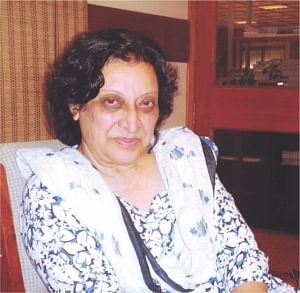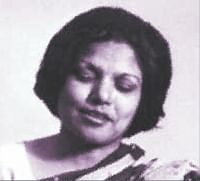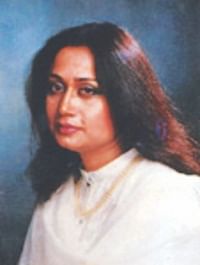| Home - Back Issues - The Team - Contact Us |
 |
| Volume 11 |Issue 25| June 22, 2012 | |
|
|
Musings Hawa ki Beti Syed Maqsud Jamil Pakistan's society is perceived by the rest of the world as one which is known for curtailing the freedoms of women. With greater influence of religious extremists and a culture based on patriarchy and feudalism the moral standards for the majority of women have become even sterner than before.
In spite of this, feminist voices have gathered strength and Pakistan has seen a significant emergence of Urdu women poets. They have led the movement for women's rights, striving to resist the hegemonistic forces of state, class, religion and gender bias. What has been achieved is notable. For this achievement, the leading women poets of Pakistan have been fiery forces. They are Kishwar Naheed [born 1940], Fahmida Riaz [born 1946], Parveen Shakir [born 1952, died 1995] and Ishrat Afreen [born 1956] are held in high regard. The feminine voice against persecution of women came to a head when General Zial-ul-Haq enacted Hudood Ordinance in 1979, as part of his plan for introduction of Sharia laws. What enraged the feminist poets was the clause to enforce punishment for Zina [extramarital sex]. There was little scope for justice for the woman alleging rape because she had to produce four adult male eyewitnesses. If the woman failed to produce witnesses and admitted intercourse she was accused of adultery. The miscarriage of justice was blatant. An elderly couple Fahmida and Allah Bux were sentenced for transgressing zina laws and Pakistan saw its first public stoning to death. Lal mai, a thirty five year old woman of Bahawalpur, was publicly whipped for adultery. Fahmida Riaz is the boldest among the women poets. She and Kishwar Naheed took the frontal collision course with Zia-ul-Haq's Hudood ordinance. She is an indomitable voice in articulating her bold feminist thoughts and consciousness. Her indictment of Zia’s regime came out in her poetry Aiwaan-e-adaalat men [In the House of Law]. The English translation – 'In the house of justice/the eyes are dazed/the face is distraught/the breathing is bated/in the fleshy tongue/the words are dumb//the earnest plea/was convulsing in tears/the custodians of law/took away the one yesterday/has now brought her here/they at least showed the dead body//the face is distraught/one gust of breath that pulsated/ flares leapt up somewhere/so long somebody understood the message/lo the spirit flows on stronger/the response was overwhelming/and the slogans resonated/the innocent lives/ of the youth unbound/ what a roar was there in their blood/what a resonance was there in the slogans// in the house of law/ the frowning chamber/heart stopping verdict/when the blood eyed salutation came/ when the name of the murder victim came/ it felt like a punch landed on the heart/ blood spurted from the eyes/ long live the brave/at least somewhere a rock has been shattered'.
Kishwar Naheed was the Director General of Pakistan National Council of Arts. Her poetry is endowed with her enlightenment, influenced by her experiences and self-introspection. One of her poem is Ham ki magaloob-e-gumaan [Defeated by Suspicion]. The English translation is 'We were subdued by suspicion first/ They are there where they were first// My desires surfaced as wrinkles/ Wounds were hidden in my chest first// Now (you) make me cry over everything (talk)/Aware of the profit loss before// As if a thorn has come out of my heart/ Tears flowed from my eyes before// Now merely the gathering place is decorated/ Those who had complete faith at first// A head made of snow on (my?) shoulder/ We were a tongue of flame before//My twin is my loneliness/ Where were relations like this before?’ Parveen Shakir did her MA in Public Administration from Harvard University. Her tragic death was a great loss for Urdu poetry. She died in a road accident in 1995; her car collided head on with a truck. There is tranquillity and mellow lucidity about her poetry. The reader would find a whole range of emotive quality about her poetry, pain and playfulness, innocence and enquiry, restraint and budding sexuality. Her famous poetry is Cheharaa meraa tha nigahe us kii [Face was mine eyes his]. The English translation is 'face was mine eyes were his/ even in silence those words were his// kept on writing gazals on my face/verses composing eyes of his// giving indication of intimate moments/ ascending breathing of his// I have even gone through such a time/ when morning was mine evening his// in a trance sometime his state was such/ eyes were that of the moon and memories his//verdict was written by gust of wind/ tempest was mine spring his//often sleep was broken with the thought/how did he spend the night/even when far away ever present is/his arm holding me'. Ishrat Afreen is among the leading feminist voices in Pakistani Urdu poetry. She started her career as a journalist. Her famous poem is ‘We sinful women’, The English translation is; 'made cold by bitterness of hunger, taut lips chapped / dry, spewing blood, yellow lips/ broken bangles, cold girl, rebellious age/raw body, stone eyes, blue lips/ forlorn courtyard, lonely woman, stretched life/ empty eyes, drenched bosom, wet lips blue/ vitriol of unformed, accusing words/ if they only touch, you fool, they bruised lips/ they demand venom, never even tasting the elixir/ rebellious, stubborn, obsessive, adamant lips/ such parched exchanges, such bitter words/ from such pretty, supple, red, juicy lips/ what will people think if you talk so much/ tradition here is that girls stitch their lips'. The Pakistani feminist Urdu poets are the first of their kind. They articulate women's rights through their poetry and challenge autocratic establishment with great commitment and resolve. It is a remarkable phenomenon. They are the worthy daughters [Hawa ki Beti] of Eve and will inspire the feminist movement to grow even stronger.
|
||||||||||||
|


